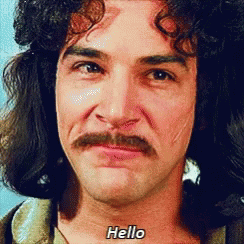The talk addresses the observation that positivity or positive thinking is like a new form of political correctness. When someone is not happy, relaxed, or hopeful, we act like there’s something wrong, and we try to fix it. Overall, I really enjoyed this talk. It resonated with me.
Because sometimes life just hurts.
And sometimes it doesn’t.
The way people use that word positive bugs me. In the words of one of my heroes, “You keep using that word. I do not think it means what you think it means.”
 |
| I'm okay with the way we use that word. |
Feeling sad, scared, anxious, conflicted, lonely, angry, disgusted, is also a part of living as a human. These “negative” feelings happen to everyone at some time. If you find that these feelings dominate your experience, I recommend you change something. Therapy could be useful as you make that change, and it’s not the only way.
In psychiatry/psychology, we use the words positive and negative more mathematically. Positive means adding something, and negative means taking something away.
For example, schizophrenia has positive and negative symptoms. Positive symptoms are new things that have been added to the person’s experience, like hallucinations and paranoid thoughts that they didn’t have before. Negative symptoms are things the person used to experience, but doesn’t now, like the decrease in range of expression or decrease in social interaction (note: not all of these are diagnostic criteria for schizophrenia, but they are all common changes for people with schizophrenia).
Behaviorists talk about positive and negative in context of both rewards AND punishments. Say you give your kid a special dessert when they get an A on a test at school. That’s a positive reward—you add something that they like or want. Alternatively, you could remove their responsibility for their least favorite chore. It’s still a reward (a consequence they like), but it’s a reward by subtraction—a negative reward.
Now imagine that you’re convicted of some kind of minor crime, something non-violent and not very destructive. You could receive a positive punishment, like community service (something unpleasant that’s added to your routine), or a negative punishment like fines (taking away money) or jail time (taking away freedom).
The way I see it, no emotion is negative, and no emotion is positive. They’re all just there, all coexisting, taking turns at center stage. None of them gets added or taken away. They’re cued to take their turn by things that happen around us or inside us, but they don’t just stop happening. When it’s time for happiness or excitement to take a turn, we usually welcome it, because we know what to do about it—we hold our heads high, square our shoulders and show the world what’s up.
But when it’s time for sadness, we pretend it’s not there, because we have to stay positive.
It’s really hard to let all of our feelings take their turn, because some of them are really painful. When Camille and I went through the aftermath of a miscarriage, there were days when my sadness and anger made me not want to exist. I never wanted to commit suicide, I just wanted life to not be a thing anymore sometimes
When we let them all take a turn, they all take a turn. That time sadness had a really, really long turn. And then it moved on, and so did I. That turn was and is a real part of my life, just like the kid I didn’t get to welcome into the world is a real part of my life. Thinking about that time still brings up an echo of that feeling, but it’s just an echo. The echo fades, and I’m back in whatever is happening now.
So I say enough positivity. Live life with all its... life-ful... stuff. Let’s make it okay for ourselves and the people around us to experience all of it.
No comments:
Post a Comment